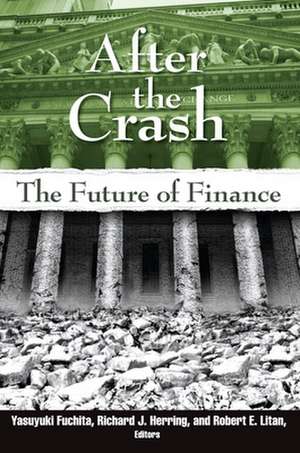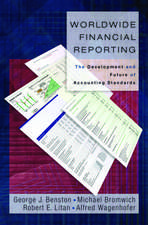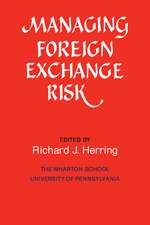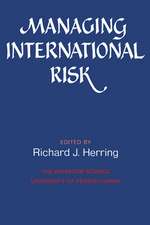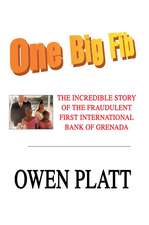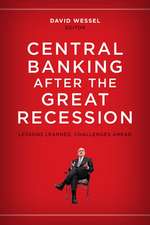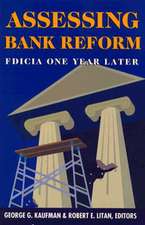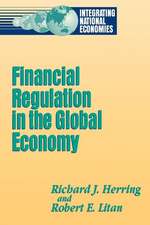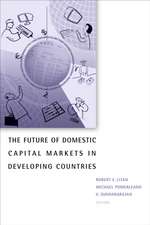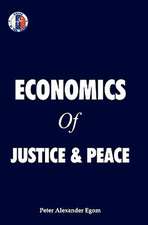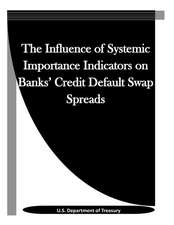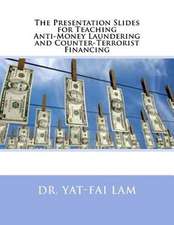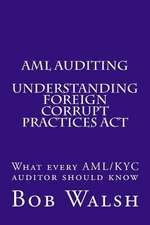After the Crash: The Future of Finance
Editat de Yasuyuki Fuchita, Richard J. Herring, Robert E. Litanen Limba Engleză Paperback – 24 aug 2010
As the global economy continues to weather the effects of the recession brought on by the financial crisis of 2007–08, perhaps no sector has been more affected and more under pressure to change than the industry that was the focus of that crisis: financial services. But as policymakers, financial experts, lobbyists, and others seek to rebuild this industry, certain questions loom large. For example, should the pay of financial institution executives be regulated to control risk taking? That possibility certainly has been raised in official circles, with spirited reactions from all corners. How will stepped-up regulation affect key parts of the financial services industry? And what lies ahead for some of the key actors in both the United States and Japan?
In After the Crash, noted economists Yasuyuki Fuchita, Richard Herring, and Robert Litan bring together a distinguished group of experts from academia and the private sector to take a hard look at how the financial industry and some of its practices are likely to change in the years ahead. Whether or not you agree with their conclusions, the authors of this volume—the most recent collaboration between Brookings, the Wharton School, and the Nomura Institute of Capital Markets Research—provide well-grounded insights that will be helpful to financial practitioners, analysts, and policymakers.
In After the Crash, noted economists Yasuyuki Fuchita, Richard Herring, and Robert Litan bring together a distinguished group of experts from academia and the private sector to take a hard look at how the financial industry and some of its practices are likely to change in the years ahead. Whether or not you agree with their conclusions, the authors of this volume—the most recent collaboration between Brookings, the Wharton School, and the Nomura Institute of Capital Markets Research—provide well-grounded insights that will be helpful to financial practitioners, analysts, and policymakers.
Preț: 253.51 lei
Nou
Puncte Express: 380
Preț estimativ în valută:
48.52€ • 50.46$ • 40.05£
48.52€ • 50.46$ • 40.05£
Carte tipărită la comandă
Livrare economică 14-28 aprilie
Preluare comenzi: 021 569.72.76
Specificații
ISBN-13: 9780815704041
ISBN-10: 0815704046
Pagini: 150
Ilustrații: Illustrations
Dimensiuni: 152 x 229 x 13 mm
Greutate: 0.24 kg
Editura: Brookings Institution Press
Colecția Brookings Institution Press/Nomura Inst.
ISBN-10: 0815704046
Pagini: 150
Ilustrații: Illustrations
Dimensiuni: 152 x 229 x 13 mm
Greutate: 0.24 kg
Editura: Brookings Institution Press
Colecția Brookings Institution Press/Nomura Inst.
Notă biografică
Yasuyuki Fuchita is a senior managing director at the Nomura Institute of Capital Markets Research in Tokyo. He coedited Prudent Lending Restored (Brookings, 2009) with Richard J. Herring and Robert E. Litan and Pooling Money (Brookings, 2008) with Litan.
Richard J. Herring is the Jacob Safra Professor of International Banking and professor of fi nance at the Wharton School, University of Pennsylvania, where he is also codirector of the Wharton Financial Institutions Center.
Robert E. Litan is a senior fellow in Economic Studies at the Brookings Institution and vice president for research and policy at the Kauffman Foundation. His many books include Good Capitalism, Bad Capitalism, and the Economics of Growth Prosperity (Yale University Press, 2007), written with William J. Baumol and Carl J. Schramm.
Richard J. Herring is the Jacob Safra Professor of International Banking and professor of fi nance at the Wharton School, University of Pennsylvania, where he is also codirector of the Wharton Financial Institutions Center.
Robert E. Litan is a senior fellow in Economic Studies at the Brookings Institution and vice president for research and policy at the Kauffman Foundation. His many books include Good Capitalism, Bad Capitalism, and the Economics of Growth Prosperity (Yale University Press, 2007), written with William J. Baumol and Carl J. Schramm.
Descriere
A Brookings Institution Press and Nomura Institute of Capital Markets Research publication
As the global economy continues to weather the effects of the recession brought on by the financial crisis of 2007–08, perhaps no sector has been more affected and more under pressure to change than the industry that was the focus of that crisis: financial services. But as policymakers, financial experts, lobbyists, and others seek to rebuild this industry, certain questions loom large. For example, should the pay of financial institution executives be regulated to control risk taking? That possibility certainly has been raised in official circles, with spirited reactions from all corners. How will stepped-up regulation affect key parts of the financial services industry? And what lies ahead for some of the key actors in both the United States and Japan?
In After the Crash, noted economists Yasuyuki Fuchita, Richard Herring, and Robert Litan bring together a distinguished group of experts from academia and the private sector to take a hard look at how the financial industry and some of its practices are likely to change in the years ahead. Whether or not you agree with their conclusions, the authors of this volume—the most recent collaboration between Brookings, the Wharton School, and the Nomura Institute of Capital Markets Research—provide well-grounded insights that will be helpful to financial practitioners, analysts, and policymakers.
As the global economy continues to weather the effects of the recession brought on by the financial crisis of 2007–08, perhaps no sector has been more affected and more under pressure to change than the industry that was the focus of that crisis: financial services. But as policymakers, financial experts, lobbyists, and others seek to rebuild this industry, certain questions loom large. For example, should the pay of financial institution executives be regulated to control risk taking? That possibility certainly has been raised in official circles, with spirited reactions from all corners. How will stepped-up regulation affect key parts of the financial services industry? And what lies ahead for some of the key actors in both the United States and Japan?
In After the Crash, noted economists Yasuyuki Fuchita, Richard Herring, and Robert Litan bring together a distinguished group of experts from academia and the private sector to take a hard look at how the financial industry and some of its practices are likely to change in the years ahead. Whether or not you agree with their conclusions, the authors of this volume—the most recent collaboration between Brookings, the Wharton School, and the Nomura Institute of Capital Markets Research—provide well-grounded insights that will be helpful to financial practitioners, analysts, and policymakers.
